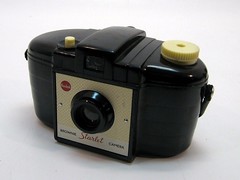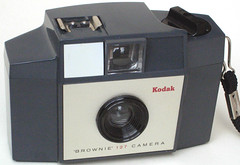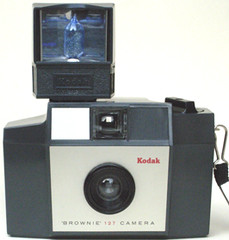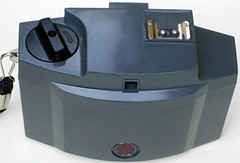Difference between revisions of "Kodak Brownie 127"
(Changed the tex and image layouts, changes spec table style, added image) |
(Present tense; changes to text; ref to McKeown for 'fakes' story.) |
||
| Line 1: | Line 1: | ||
| + | __NOTOC__ | ||
{{Flickr image | {{Flickr image | ||
| image_source=http://www.flickr.com/photos/10456228@N00/7502031338/in/pool-camerawiki | | image_source=http://www.flickr.com/photos/10456228@N00/7502031338/in/pool-camerawiki | ||
| Line 8: | Line 9: | ||
}} | }} | ||
| − | The '''Kodak Brownie 127''' | + | The '''Kodak Brownie 127''' is a plastic box camera for eight 4x6 cm pictures on [[127 film]], made in England by [[Kodak Ltd.]] It was an extremely popular snapshot camera in Britain. From its introduction in 1952, over a million had been made by August 1954, and the series continued to sell many more millions. A few (~263,000) of the first model were exported to the US in 1953-4, where they were badged '''Brownie Starlet''', not to be confused with the more common [[Kodak Brownie Starlet|Brownie Starlet]]. |
| − | From introduction in 1952, over a million had been made by August 1954, and the series continued to sell many more millions. A few (~263,000) of the first model were exported to the US in 1953-4, where they were badged '''Brownie Starlet''' | ||
| − | The | + | The camera has a plastic meniscus lens, identified as a 'Dakon' in the second model, with no aperture or focus controls, and a single-speed shutter (the speed is about 1/50 second; there is not even 'B'). The only controls are the film advance (a wide flat knob at the left hand side) and the shutter release button. The camera has a reverse-Galilean viewfinder. |
| − | The | + | The first version of the camera is made of a dark brown [[Bakelite]]-type plastic and has a rounded shape, especially when seen from above. This shape follows naturally from the curved path of the film, allowing for the curved field of the simple lens. The film carrier mechanism and viewfinder are attached to the top of the camera, which lifts out from the body for loading (when released by a catch in the base). The lens and shutter are mounted in the body section. The sides are moulded in a broad horizontal striped pattern, and there are shallow steps each side of the viewfinder. The body of the second version is very similar, but moulded in a vertical ribbed texture on the sides, and it has a flatter top. There were other small changes of faceplate and detailing; some cameras have cream controls, later models having grey. A white version, with a silver top, was made and only sold in Jersey in the Channel Islands - in c.1959; it was not successful, as the colour dirtied very easily. McKeown states that fakes of this rare variant have been made by painting the regular camera.<ref name=McK>{{McKeown12}} p478.</ref> |
| + | |||
| + | The third 'Brownie 127' is a completely different camera. It is made from grey plastic, with flat sides and angular corners. It makes twelve 4x4cm images on a roll of film. The shutter on this model has double-exposure prevention and is [[flash sync|synchronised]] for flash, and a shoe for a special Kodak flash-holder (introduced for the [[Instamatic|Instamatic range]]) was added to the top. The shutter release is a large white square button on the front, beside the viewfinder. | ||
=== Specifications === | === Specifications === | ||
| Line 128: | Line 130: | ||
|} | |} | ||
| − | The [[Kodak Brownie Cresta|Brownie Cresta]] | + | The [[Kodak Brownie Cresta|Brownie Cresta]] is a similar camera, but made larger (for [[120 film]]) and with a close-focus setting, and some angles introduced. |
| + | |||
| + | |||
| + | ==Notes== | ||
| + | <references/> | ||
| + | |||
== Sources == | == Sources == | ||
| Line 134: | Line 141: | ||
* Chuck Baker's [http://www.brownie-camera.com Brownie Camera site] - including instruction books | * Chuck Baker's [http://www.brownie-camera.com Brownie Camera site] - including instruction books | ||
| − | + | ||
| + | == Links == | ||
* [http://www.onetwoseven.org.uk/cameras/kodak/b127.html Brownie 127] on [http://www.onetwoseven.org.uk/ OneTwoSeven.com] | * [http://www.onetwoseven.org.uk/cameras/kodak/b127.html Brownie 127] on [http://www.onetwoseven.org.uk/ OneTwoSeven.com] | ||
* [http://www.brownie-camera.com/6.shtml 1956 model] on [http://www.brownie-camera.com Brownie-Camera.com] by Chuck Baker | * [http://www.brownie-camera.com/6.shtml 1956 model] on [http://www.brownie-camera.com Brownie-Camera.com] by Chuck Baker | ||
| Line 146: | Line 154: | ||
[[Category: B|Brownie 127]] | [[Category: B|Brownie 127]] | ||
[[Category: 127 film]] | [[Category: 127 film]] | ||
| − | + | [[Category: 4x4 ]] | |
| − | [[Category: 4x4]] | + | [[Category: 4x6.5 box]] |
| − | [[Category: 4x6.5]] | ||
Revision as of 01:28, 6 July 2012

|
| Kodak Brownie 127 image by Morinaka. (Image rights) |
The Kodak Brownie 127 is a plastic box camera for eight 4x6 cm pictures on 127 film, made in England by Kodak Ltd. It was an extremely popular snapshot camera in Britain. From its introduction in 1952, over a million had been made by August 1954, and the series continued to sell many more millions. A few (~263,000) of the first model were exported to the US in 1953-4, where they were badged Brownie Starlet, not to be confused with the more common Brownie Starlet.
The camera has a plastic meniscus lens, identified as a 'Dakon' in the second model, with no aperture or focus controls, and a single-speed shutter (the speed is about 1/50 second; there is not even 'B'). The only controls are the film advance (a wide flat knob at the left hand side) and the shutter release button. The camera has a reverse-Galilean viewfinder.
The first version of the camera is made of a dark brown Bakelite-type plastic and has a rounded shape, especially when seen from above. This shape follows naturally from the curved path of the film, allowing for the curved field of the simple lens. The film carrier mechanism and viewfinder are attached to the top of the camera, which lifts out from the body for loading (when released by a catch in the base). The lens and shutter are mounted in the body section. The sides are moulded in a broad horizontal striped pattern, and there are shallow steps each side of the viewfinder. The body of the second version is very similar, but moulded in a vertical ribbed texture on the sides, and it has a flatter top. There were other small changes of faceplate and detailing; some cameras have cream controls, later models having grey. A white version, with a silver top, was made and only sold in Jersey in the Channel Islands - in c.1959; it was not successful, as the colour dirtied very easily. McKeown states that fakes of this rare variant have been made by painting the regular camera.[1]
The third 'Brownie 127' is a completely different camera. It is made from grey plastic, with flat sides and angular corners. It makes twelve 4x4cm images on a roll of film. The shutter on this model has double-exposure prevention and is synchronised for flash, and a shoe for a special Kodak flash-holder (introduced for the Instamatic range) was added to the top. The shutter release is a large white square button on the front, beside the viewfinder.
Specifications
| First model | Second model | Third model | |
|---|---|---|---|
| Description: | Rounded, Stepped sides | Rounded, Sloping sides, Vertical lines; Larger viewfinder |
Angled corners Flash synch |
| In production: | 1952-1959 | April 1959-1963 | November 1965-November 1967 |
| Lens: | Meniscus, f/14, 64mm | Dakon, f/11, plastic | Plastic, f/14, 51mm |
| Shutter: | Rotary, 1/50th | Rotary, 1/40th | Rotary, 1/40th |
| Frame size: | 6x4cm | 6x4cm | 4x4cm |

|
| Brownie 127 - First model image by AWCam (Image rights) |

|
| Brownie 127 - First Model (shown open) image by AWCam (Image rights) |

|
| Brownie 127 - Second model image by Dirk HR Spennemann (Image rights) |

|
| Starlet-badged US export variant image by Terri Monahan (Image rights) |

|
| Starlet-badged US export variant photo by ebayer Dawn Laciak, used by permission image by AWCam (Image rights) |
|
|
| ||||||
| Brownie 127 - Third version |
The Brownie Cresta is a similar camera, but made larger (for 120 film) and with a close-focus setting, and some angles introduced.
Notes
- ↑ McKeown, James M. and Joan C. McKeown's Price Guide to Antique and Classic Cameras, 12th Edition, 2005-2006. USA, Centennial Photo Service, 2004. ISBN 0-931838-40-1 (hardcover). ISBN 0-931838-41-X (softcover). p478.
Sources
- Coe, Brian, Kodak Cameras, the First Hundred Years, Hove Foto Books, 1987
- Chuck Baker's Brownie Camera site - including instruction books
Links
- Brownie 127 on OneTwoSeven.com
- 1956 model on Brownie-Camera.com by Chuck Baker
- Third, 1965 model on Brownie-Camera.com by Chuck Baker
- Second model Instruction Manual on Chuck Baker's site.
- Brownie 127,Brownie 127, Brownie 127, Brownie 127 1965 on www.collection-appareils.fr by Sylvain Halgand
- Snapshot cameras, including the Brownie 127 by the Marriotts


